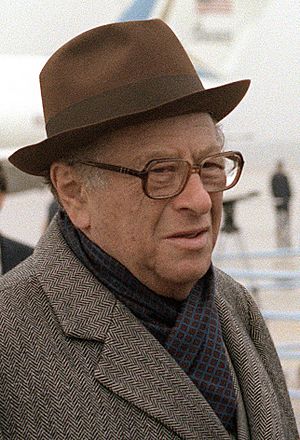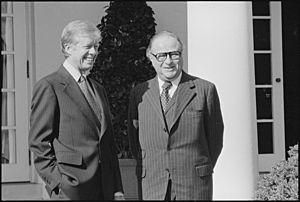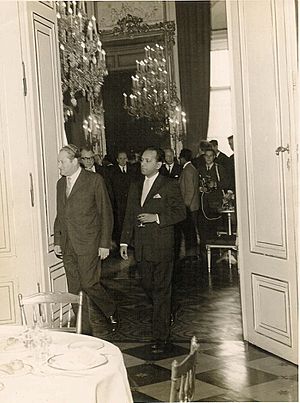Bruno Kreisky facts for kids
Quick facts for kids
Bruno Kreisky
|
|
|---|---|

Kreisky, photographed in 1983
|
|
| Chancellor of Austria | |
| In office 21 August 1970 – 24 May 1983 |
|
| President | |
| Vice-Chancellor |
|
| Preceded by | Josef Klaus |
| Succeeded by | Fred Sinowatz |
| Chair of the Social Democratic Party | |
| In office 1 February 1967 – 27 October 1983 |
|
| Preceded by | Bruno Pittermann |
| Succeeded by | Fred Sinowatz |
| Minister of Foreign Affairs | |
| In office 16 July 1959 – 19 April 1966 |
|
| Chancellor |
|
| Preceded by | Leopold Figl |
| Succeeded by | Lujo Tončić-Sorinj |
| Personal details | |
| Born | 22 January 1911 Vienna, Austria-Hungary |
| Died | 29 July 1990 (aged 79) Vienna, Austria |
| Resting place | Vienna Central Cemetery |
| Political party | Social Democratic Party |
| Spouse |
Vera Fürth
(m. 1942; died 1988) |
| Children | 2 |
| Education | University of Vienna |
Bruno Kreisky (German: [ˈbʁuːno ˈkʁaɪ̯ski]; 22 January 1911 – 29 July 1990) was an important Austrian politician. He was a member of the Social Democratic Party. He served as Foreign Minister from 1959 to 1966. Later, he became Chancellor from 1970 to 1983.
His 13 years as Chancellor was the longest time any Chancellor served in Austria after World War II. This period is often called the "Kreisky era." He is seen as one of the most important political leaders in Austria. He also worked closely with other social democratic leaders in Europe, like Willy Brandt from West Germany and Olof Palme from Sweden.
Early Life and Political Journey
Bruno Kreisky was born in Margareten, a part of Vienna, Austria. His family was Jewish, but they were not very religious. His father worked in the textile business. When he was 15, in 1925, he was shocked by the poverty and violence in Austria. This led him to join the youth group of the Socialist Party.
In 1929, he started studying law at the University of Vienna. He stayed active in politics during his studies. In 1934, the Socialist Party was banned by the government. Bruno Kreisky continued his political work secretly. He was arrested in 1935 but was released in 1936.
In March 1938, Austria became part of Germany. This event was called the Anschluss. To escape the persecution of Jewish people by the Nazis, Kreisky moved to Sweden in September 1938. He stayed there until 1945. In Sweden, he married Vera Fürth in 1942, and they had two children.
Returning to Austria and Key Roles
Bruno Kreisky came back to Austria in May 1946. He soon returned to Stockholm to work for the Austrian government. In 1951, he moved back to Vienna. There, he became an important adviser to the Austrian President.
In 1953, he was made Undersecretary in the Foreign Affairs Department. In this role, he helped negotiate the 1955 Austrian State Treaty. This treaty was very important because it ended the occupation of Austria by four powers. It also made Austria independent and neutral again.
Becoming a Member of Parliament
Kreisky was elected to the Austrian parliament, called the Nationalrat, in 1956. He became a key member of the Socialist Party's leadership.
After the 1959 election, he became the Foreign Minister. He kept this job under different Chancellors. He played a big part in creating the European Free Trade Association. He also helped solve a problem with Italy about the South Tyrol region. He even suggested a "Marshall Plan" to help developing countries.
In 1966, the opposing party, the Austrian People's Party (ÖVP), won a majority of seats. They decided to govern alone, ending the "grand coalition" that had ruled Austria since 1945. Kreisky resigned from his government position.
Leading the Socialist Party
In February 1967, Bruno Kreisky was chosen as the chairman of the Socialist Party. In the March 1970 elections, the Socialists won 81 seats. This was almost a majority. Kreisky then became the first Socialist Chancellor since 1920. He led the first government in modern Austrian history made only of left-wing politicians. He was also Austria's first Jewish Chancellor.
Kreisky's government was supported by the Freedom Party. In return, they passed reforms that made elections fairer. After these reforms, he called for new elections in October 1971. Even though the reforms were meant to help smaller parties, the Socialists won a strong majority with 93 seats. They also won half of all the votes, which no Austrian party had ever done in a free election.
Kreisky was reelected in 1975 and 1979. Each time, his party won comfortably.
End of Chancellorship
In 1981, Kreisky turned 70. Voters started to feel he was too focused on international issues. In the 1983 election, the Socialists lost their absolute majority. Kreisky decided not to form a government that didn't have a majority. He resigned and suggested Fred Sinowatz as his replacement.
Kreisky's health began to decline. He had a kidney transplant in 1984. He passed away in Vienna in July 1990.
Key Ideas and Programs
As Chancellor, Bruno Kreisky and his Justice Minister, Christian Broda, brought many modern changes to Austria. They improved family laws and prisons. Kreisky also worked to improve relations between the Catholic Church and the Socialist movement.
He promised to reduce the time people had to serve in the military. After he was elected, military service was shortened.
Social Reforms
During Kreisky's time as Chancellor, many progressive reforms were made.
- Employee benefits were improved.
- The workweek was shortened to 40 hours.
- Laws were passed to ensure equality for women.
- His government also protected the language rights of the Slovene and Croatian minorities in Austria.
- The penal code (laws about crimes) was updated.
- Discrimination against children born outside of marriage was removed.
- Grants were given for marriages.
- A "mother-child pass" program was started for health care during pregnancy and for babies.
- Four weeks of paid vacation were introduced for workers.
- An ombudsman office was created to help citizens with government issues.
- Laws were passed to protect consumers.
- Self-employed people gained social security coverage.
- In 1979, rules were made to protect employees from being fired unfairly.
Health and Education Improvements
- In 1970, pensions for widows were linked to inflation.
- In 1972, free medical check-ups became available for healthy people.
- Optional health insurance for students was introduced.
- Periods of study, illness, and unemployment could count towards pension eligibility.
- In 1974, family and birth benefits were also linked to inflation.
- The 1973 Special Subsidies Act helped people who lost their jobs due to big economic changes.
- The 1974 Wage Continuation Act made sure workers in private companies still got paid if they were sick.
- In 1976, accident insurance was expanded to cover work-related activities.
- A 1981 law introduced special early retirement for people doing heavy manual work.
Full sick pay was given to blue-collar workers in 1974. Family benefits were expanded to include:
- Full school transport (1971).
- A marriage payment (1972).
- Payment for school books (1974).
- A birth payment (1976).
Between 1973 and 1980, spending on health and education increased a lot. In education, the number of students per teacher decreased. A new university law in 1975 made higher education more accessible. Many more Austrians were able to go to university.
Other Important Laws
- The 1972 Crime Victims Act provided compensation for people harmed by crimes.
- The 1974 Town Renovation Act helped improve residential areas in towns.
- The 1975 Housing Property Act established the rights of house and apartment owners.
- In 1975, housing support was expanded to cover costs of home improvements.
- In 1974, the time off for mothers before and after childbirth was extended to 8 weeks. This was also extended to adoptive mothers in 1976.
- A 1981 law updated pension plans and introduced a widower's pension, similar to a widow's pension.
- In 1976, accident insurance was introduced for students.
- A law passed in 1976 allowed people to take care of sick close relatives.
- The 1979 Bankruptcy Wage Continuation Act ensured workers were paid if their company went bankrupt.
- In 1982, self-employed women received a maternity allowance for 16 weeks.
International Relations
Kreisky was very active in international affairs. He encouraged talks between North Korea and South Korea. He also worked with leaders like Willy Brandt and Olof Palme to promote peace and development around the world.
Even though Austria could not join the European Union because of the 1955 State Treaty, Kreisky supported European cooperation. Austria became a bridge between Eastern and Western countries. Vienna hosted important talks between the United States and the Soviet Union about limiting weapons.
Kreisky, who was Jewish, had unique views on Zionism (the movement for a Jewish homeland). He believed Jews were a religious group, not an ethnic group. However, he did not oppose the existence of Israel. He had friendly relations with the Israeli Labor Party. He also became friends with Arab leaders like Anwar Sadat and Muammar Gaddafi. In 1980, Austria established relations with the Palestine Liberation Organization. He tried to use his position to help mediate between Israel and Arab nations.
Disagreements and Legacy
Kreisky faced some criticism for appointing politicians who had been members of the Nazi party in their youth. When Nazi hunter Simon Wiesenthal pointed this out, Kreisky defended his choices. He believed that people had the right to make political mistakes when they were young. This led to a long and public disagreement between Kreisky and Wiesenthal.
In 1976, the Bruno Kreisky Foundation for Human Rights was created to celebrate his 65th birthday. Every two years, the Bruno Kreisky Human Rights Prize is given to someone who has done great work for human rights around the world.
Later in his life, Kreisky tried to help some people who were speaking out against the Soviet government.
What People Remember
Today, people have different opinions about Kreisky's time as Chancellor. Many of his supporters remember him as a great socialist leader. They recall a time when the standard of living in Austria was rising. The welfare state (government support for citizens) was strong, and children from working-class families were encouraged to get higher education. This led to a time of prosperity and hope for the future.
Some critics, however, point to Kreisky's policy of spending more money than the government earned. He famously said he preferred the government to have high debts rather than people being unemployed. These critics believe his policies caused economic problems for Austria later on.
Despite these different views, Bruno Kreisky greatly changed Austria during his time in office. He improved working conditions, raised the average standard of living, and expanded the welfare state. He is still considered one of Austria's most successful socialist Chancellors.
See also
 In Spanish: Bruno Kreisky para niños
In Spanish: Bruno Kreisky para niños
- Chancellor of Austria for a complete list of Federal Chancellors since the founding of the Republic in 1918
- Kreisky-Peter-Wiesenthal affair
 | Valerie Thomas |
 | Frederick McKinley Jones |
 | George Edward Alcorn Jr. |
 | Thomas Mensah |



